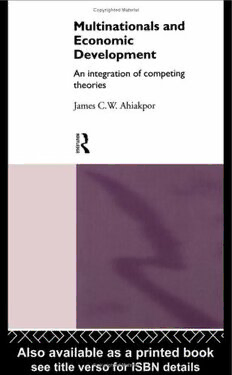Download Multinationals and Economic Development: An Integration of Competing Theories PDF Free - Full Version
Download Multinationals and Economic Development: An Integration of Competing Theories by James C. W. Ahiakpor in PDF format completely FREE. No registration required, no payment needed. Get instant access to this valuable resource on PDFdrive.to!
About Multinationals and Economic Development: An Integration of Competing Theories
Multinationals dominate world trade and direct investment. However, less developed countries have often regarded this power as detrimental to their fragile, growing economies and have pursued a policy of regulation. Modern economic theories of multinationals need to evaluate the effects of such policies. This book offers an alternative to restrictive policies, arguing that multinationals are best treated in the same way as local private firms. By integrating new theories of multinational enterprise and of development economics, the author presents a critical analysis of the various competing policy options and their consequences. Using empirical evidence from Asia, Africa and Latin America and covering such areas as imports, exports, resource utilization and new technology, the author asserts that a classical, neutralist policy towards MNCs would be the most effective way of stimulating growing economies. The book should interest those looking at less developed countries and those studying business and applied economics.
Detailed Information
| Author: | James C. W. Ahiakpor |
|---|---|
| Publication Year: | 1991 |
| ISBN: | 415022827 |
| Pages: | 117 |
| Language: | English |
| File Size: | 0.639 |
| Format: | |
| Price: | FREE |
Safe & Secure Download - No registration required
Why Choose PDFdrive for Your Free Multinationals and Economic Development: An Integration of Competing Theories Download?
- 100% Free: No hidden fees or subscriptions required for one book every day.
- No Registration: Immediate access is available without creating accounts for one book every day.
- Safe and Secure: Clean downloads without malware or viruses
- Multiple Formats: PDF, MOBI, Mpub,... optimized for all devices
- Educational Resource: Supporting knowledge sharing and learning
Frequently Asked Questions
Is it really free to download Multinationals and Economic Development: An Integration of Competing Theories PDF?
Yes, on https://PDFdrive.to you can download Multinationals and Economic Development: An Integration of Competing Theories by James C. W. Ahiakpor completely free. We don't require any payment, subscription, or registration to access this PDF file. For 3 books every day.
How can I read Multinationals and Economic Development: An Integration of Competing Theories on my mobile device?
After downloading Multinationals and Economic Development: An Integration of Competing Theories PDF, you can open it with any PDF reader app on your phone or tablet. We recommend using Adobe Acrobat Reader, Apple Books, or Google Play Books for the best reading experience.
Is this the full version of Multinationals and Economic Development: An Integration of Competing Theories?
Yes, this is the complete PDF version of Multinationals and Economic Development: An Integration of Competing Theories by James C. W. Ahiakpor. You will be able to read the entire content as in the printed version without missing any pages.
Is it legal to download Multinationals and Economic Development: An Integration of Competing Theories PDF for free?
https://PDFdrive.to provides links to free educational resources available online. We do not store any files on our servers. Please be aware of copyright laws in your country before downloading.
The materials shared are intended for research, educational, and personal use in accordance with fair use principles.

